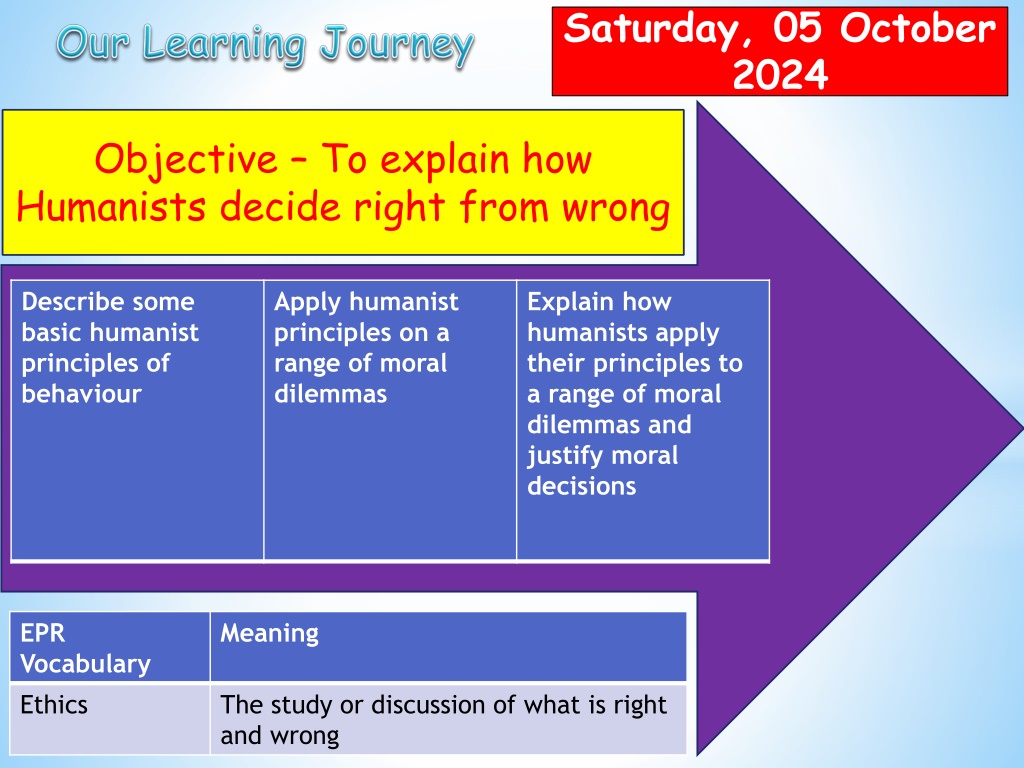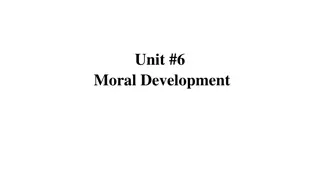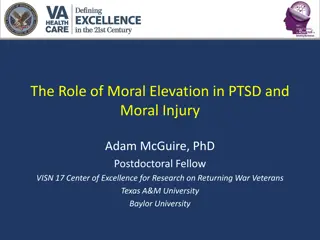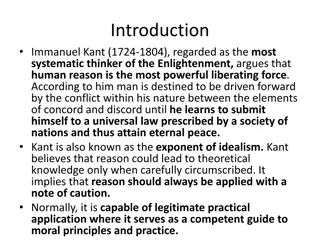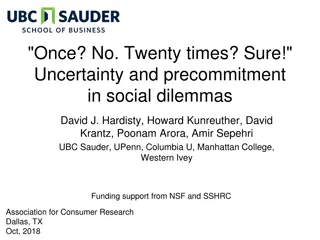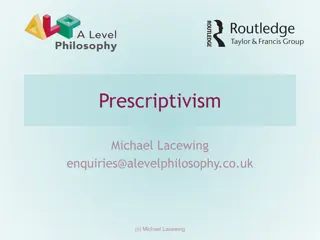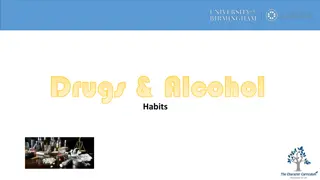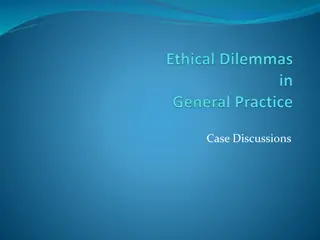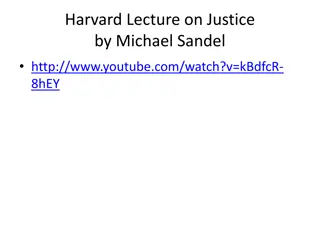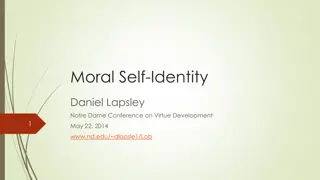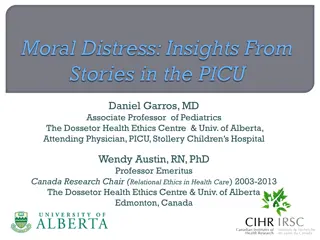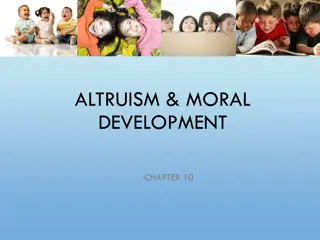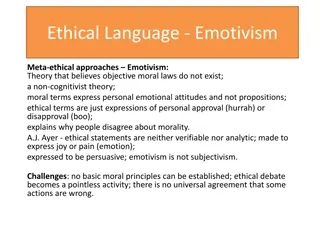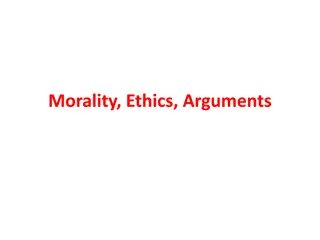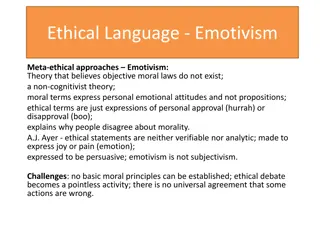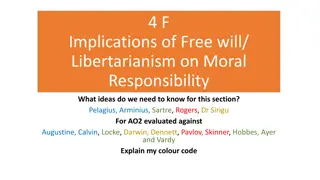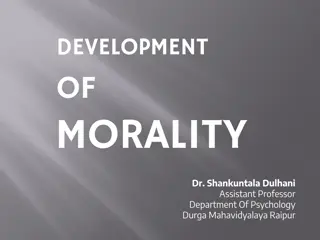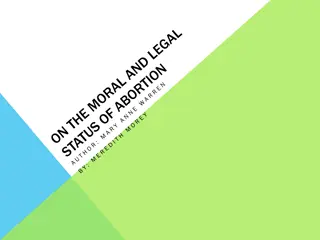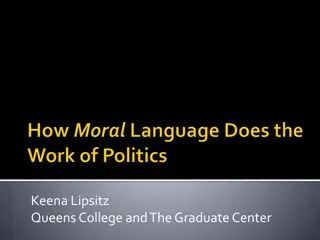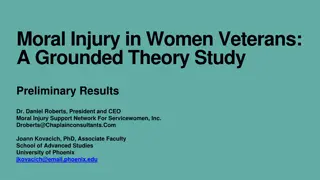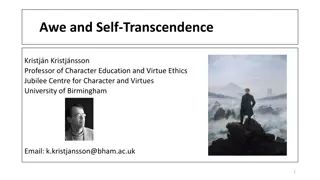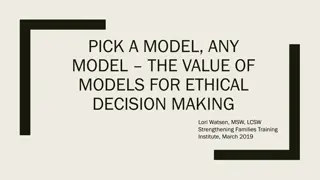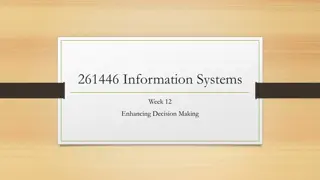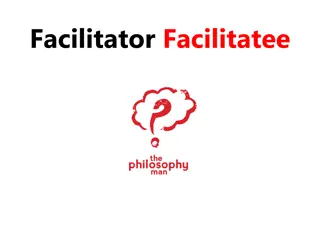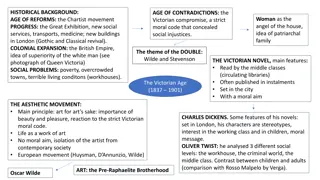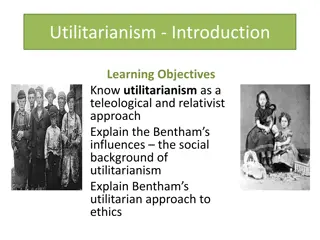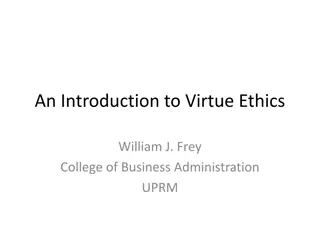Humanist Moral Decision Making: Principles and Dilemmas
Humanists determine right from wrong by considering consequences, empathy, happiness, and reason instead of religious rules. Applying principles such as empathy and the golden rule, they navigate moral dilemmas like witnessing a theft and deciding whether to involve authorities based on minimizing harm and promoting well-being.
Download Presentation

Please find below an Image/Link to download the presentation.
The content on the website is provided AS IS for your information and personal use only. It may not be sold, licensed, or shared on other websites without obtaining consent from the author. Download presentation by click this link. If you encounter any issues during the download, it is possible that the publisher has removed the file from their server.
E N D
Presentation Transcript
Saturday, 05 October 2024 Objective To explain how Humanists decide right from wrong Describe some basic humanist principles of behaviour Apply humanist principles on a range of moral dilemmas Explain how humanists apply their principles to a range of moral dilemmas and justify moral decisions EPR Vocabulary Ethics Meaning The study or discussion of what is right and wrong
https://www.youtube.com/watch?v=9tpL1K8ZqrU *What makes something right or wrong?
When making a moral decision Humanists do no refer to religious rules or holy books. Instead they consider the consequences of their actions. 1. Empathy (how would others involved feel) 2. Increasing happiness 3. Decreasing pain 4. Golden rule, treat others as you want to be treated 5. Use reason and evidence/experience Moral Dilemma For each dilemma, note down: You see a lady stealing a loaf of bread in a supermarket. She is pushing a pram and you notice a police officer walking by. Who does it involve? How would it affect those involved? Do you tell the police officer what you just saw? What might a humanist decide to do? Which principles are you applying. Explain how they link to your decision.
1. Empathy (how would others involved feel) 2. Increasing happiness 3. Decreasing pain 4. Golden rule, treat others as you want to be treated 5. Use reason and evidence/experience Moral Dilemma You see a lady stealing a loaf of bread in a supermarket. She is pushing a pram and you notice a police officer walking by. For each dilemma, note down: Who does it involve? Lady, police, child, shop keeper, you. How would it affect those involved? Lady may steal again which could cause her more harm in the long term. May be poor and need to feed the baby. Shop loses money If she is caught she may look for another way of supporting her child? What might a humanist decide to do? They may ignore it Which principles are you applying. Empathy, golden rule, decreasing pain Explain how they link to your decision. It may not be right, but on balance telling the police may cause her more pain, and using empathy and the golden rule if we were struggling to feed a child telling the police may make things worse. Also the company may not really be harmed that much compared the pain and trouble that the mother may be caused. Do you tell the police officer what you just saw?
Saturday, 05 October 2024 Objective To explain how Humanists decide right from wrong Describe some basic humanist principles of behaviour Apply humanist principles on a range of moral dilemmas Explain how humanists apply their principles to a range of moral dilemmas and justify moral decisions EPR Vocabulary Ethics Meaning The study or discussion of what is right and wrong
What is the dilemma? What is the dilemma? Who does it involve? Who does it involve? How could it affect those involved? How could it affect those involved? What might a humanist do? What might a humanist do? Which humanist principles are you applying? Which humanist principles are you applying? Explain how they link to your decision. Explain how they link to your decision. What is the dilemma? What is the dilemma? Who does it involve? Who does it involve? How could it affect those involved? How could it affect those involved? What might a humanist do? What might a humanist do? Which humanist principles are you applying? Which humanist principles are you applying? Explain how they link to your decision. Explain how they link to your decision.
Saturday, 05 October 2024 Objective To explain how Humanists decide right from wrong Describe some basic humanist principles of behaviour Apply humanist principles on a range of moral dilemmas Explain how humanists apply their principles to a range of moral dilemmas and justify moral decisions EPR Vocabulary Ethics Meaning The study or discussion of what is right and wrong
*What would you do? Sell it? Hand it in? Something else?
*What would a humanist do? Using reason means: 1. Ask yourself what will be the effects of your action. 2. Weigh up all the available evidence. 3. Try to work out what will result in the most happiness and the least pain and suffering. So what would they do with the ticket? Using empathy means: 1. Treat other people as you would like to be treated yourself (this is called the Golden Rule). 2. Treat other people as valuable in their own right and don t use them as a means to an end. 3. Do what you would be happy to see everyone do. What would YOU do with the ticket?!
Saturday, 05 October 2024 Objective To explain how Humanists decide right from wrong Describe some basic humanist principles of behaviour Apply humanist principles on a range of moral dilemmas Explain how humanists apply their principles to a range of moral dilemmas and justify moral decisions EPR Vocabulary Ethics Meaning The study or discussion of what is right and wrong
Your challenge: You will be split into groups of 5 Each group is to prepare a presentation on the Humanist view on a specific moral issue. *You can chose to either do a poster or to act it out but be clear with your message* You need to focus on WHAT Humanists believe and WHY. You will be teaching the class the humanist view on your issue. Keep your presentation simple and clear so the class can note down the main points you make. You have 15 minutes to prepare and then you will be presenting your work. As each group is presenting, you must complete your summary table. http://www.online-stopwatch.com/eggtimer-countdown/full-screen/
Issue What do humanists think? What is their reasoning? War Abortion Sexuality Environment Poverty
Issue What do humanists believe? What is their reasoning? TAG Task Why might someone disagree? War Abortion Sexuality Environment Poverty
Saturday, 05 October 2024 Objective To explain how Humanists decide right from wrong Describe some basic humanist principles of behaviour Apply humanist principles on a range of moral dilemmas Explain how humanists apply their principles to a range of moral dilemmas and justify moral decisions EPR Vocabulary Ethics Meaning The study or discussion of what is right and wrong
The Humanist view on War Humanists seek to live good lives without religious or superstitious beliefs. They use reason, experience and respect for others when thinking about moral issues, not obedience to rules. They promote happiness and fulfilment in this life because they believe it is the only one we have. Human life is all the more valuable if you do not believe in an afterlife, and humanists (indeed any rational person) would think very carefully before supporting any war, because of the loss of life involved. Wars are hugely destructive, ruining lives, wasting resources, and degrading the environment. The horrors of war, for example the enormous and pointless destruction and loss of life in the First World War and the genocide against the Jews in the Second World War, have made many people question the existence of a benevolent and omnipotent deity. Some people say that war is "natural" and that as tribal animals we are bound to want to protect our territory and tribe. Humanists would respond by saying that we should use our intelligence and ability to reason to overcome some natural instincts, and that, in the case of something as terrible as war, we should always seek non-violent solutions first. But to resort to violence in self- defence or for altruistic reasons - to protect the lives and rights of others - can sometimes be justified on a national level, just as it can on an individual level. Peaceful solutions are not always easy to find or to enforce, as the history of the United Nations demonstrates, but humanists strongly support the work of the UN aimed at resolving conflicts between nations peacefully. Humanists helped to set up the UN, and were the first directors of several UN agencies. Some humanists, such as the famous philosopher Betrand Russell, have campaigned against weapons of mass destruction and been conscientious objectors and pacifists, though Russell made an exception for the Second World War which he thought was morally justified. Non-religious people are apt to point out the numerous wars that have been fought over the centuries over religious differences, and to think that these are absurd reasons for killing other people. They also criticise the part that organised religions occasionally play in encouraging and supporting wars. Humanists are also apt to point out that liberal democracies have a very good record for not starting wars.
The Humanist view on Abortion Through reasoned consideration of the issues above, humanists conclude that abortion is often a morally acceptable choice to make. This choice is personal; the law does not impose abortion on anyone who does not want one or want to perform one. Humanists value life and value happiness and personal choice, and many actively campaigned for legalised abortion in the 1960s. Although humanists do not think all life is "sacred" they do respect life, and much in this debate hinges on when one thinks human life begins. We have seen that humanists tend to think that a foetus does not become a person, with its own feelings and rights, until well after conception. Because humanists take happiness and suffering into consideration, they are usually more concerned with the quality of life rather than the right to life, if the two come into conflict. The probable quality of life of the baby, the woman, rights and wishes of the father and the rest of the family, and the doctors and nurses involved, would all have to be given due weight. There is plenty of room for debate about how much weight each individual should have, but most humanists would probably put the interests of the woman first, since she would have to complete the pregnancy and likely care for the baby, whose happiness would largely depend on hers. She also exists already with other responsibilities and rights and feelings that can be taken into account -unlike those of the unborn foetus which cannot be so surely ascertained. Of course all possible options should be explored and decisions should be informed ones. Adoption of the unwanted baby might be the best solution in some cases, or on reflection a woman might decide that she could look after a sick or disabled child. Or she might decide that she cannot offer this child a life worth living and abortion is the better choice. She will need to consider the long- term effects as well as the immediate ones. It is unlikely to be an easy decision, and requiring an abortion is a situation that most women would prefer to avoid. For society as a whole, as well as for the children themselves, it is better if every child is a wanted child. However, abortion is not the best way of avoiding unwanted children, and improved sex education, easily available contraception, and better education and opportunities for young women, can all help to reduce the number of abortions. But as long as abortion is needed as a last resort, most humanists would agree that society should provide safe legal facilities. The alternatives, which would inevitably include illegal abortions, are far worse.
The Humanist view on the Environment Humanists seek to live good lives without religious or superstitious beliefs. They use reason, experience and respect for others when thinking about moral issues, not obedience to dogmatic rules. They promote happiness and fulfilment in this life because they believe it is the only one we have. Because of its name, some people think that humanism must be completely human-centred, concerned only with human welfare. Humanists are concerned with human welfare and happiness, but because of this concern, humanists also care about the natural world, which we all depend on and which will have to sustain our descendants. We should care about the future of our planet because we care about other human beings, even those not born yet. Because humanists have no belief in a god or supernatural force that will solve our problems for us, they know that human beings must take sole responsibility for sorting out environmental problems. We are the only ones capable of finding the solutions that can lead to a sustainable existence.Some religious people think that God created the world and gave humans "stewardship" over it. This is not a belief shared by humanists, who believe that human beings evolved and go on evolving, along with the rest of nature. Humanists find good reasons elsewhere for caring about and protecting our environment. A humanist's moral reasoning would be based on a concern for the consequences for human welfare and happiness. Our welfare is highly dependent on the environment and the continued existence of many other species. Humanists also appreciate the happiness and inspiration that contact with nature and animals can bring. When the eminent scientist and former President of the British Humanist Association, Sir Hermann Bondi, was asked why he cared about conservation, he replied, "Because I want my grandchildren to be able to see elephants. Humanists are unlikely to subscribe to "deep green" beliefs about the intrinsic value, or even superiority, of non-human nature, or to be sentimental about sweet or fluffy animals - rain forests and plankton and dung beetles are more relevant than pandas and tigers to the survival of life on this planet (though we would probably be less happy if pandas and tigers no longer existed).Humanists have a scientific view of the world, and would not automatically blame science and technology for environmental problems. Indeed, it was and is scientists - mainly biologists and ecologists - who notice and monitor environmental problems. Societies (and that means us) must take the responsibility for how we choose to use scientific and technological developments. Cleaning up our planet and finding new sources of energy will be tasks for scientists and engineers, and the rest of us (especially those of us in the wealthier nations) must be prepared to fund their work.Humanists were involved in setting up organisations such as UNESCO, which has world wide environmental responsibilities. Humanists have always supported birth control as an important contribution to lessening the demands on the environment, and were also active in helping to set up United Nations birth control programmes Humanists share many of the above ideas with rational and concerned people of all beliefs. Most environmental charities, such as Greenpeace,Friends of the Earth and the World Wide Fund for Nature, are nonreligious, and are supported by people of all faiths and none
The Humanist view on Poverty Humanists seek to live good lives without religious or superstitious beliefs. They use reason, experience and respect for others when thinking about moral issues, not obedience to dogmatic rules. They promote happiness and fulfilment in this life because they believe it's the only one we have. They do not believe in a god who gives humans moral values, or in a life after death that will compensate for earthly suffering and reward the good and punish the bad. Humanists consider that the "golden rule", Treat others as you would like to be treated" is a useful ethical principle, because it is based on the shared human need to be treated well and our aspiration to live harmoniously with others. For these reasons, humanists oppose the vast inequalities and injustices which cause so much poverty and misery. They know that if we are to improve matters it is up to us, and that we must use our knowledge and skills to help others in the way we would want to be helped. We should care about poverty, however remote from us it is, not because our god or a holy text tells us to, but because we are all members of the same species, coexisting on our small planet, and treating others fairly is the right thing to do.Besides, it is in everyone's interest to work towards a more just world - injustice and scarcity cause wars and mass displacements of population which only increase suffering and can affect us all. The humanist record Individual humanists contribute to a range of humanitarian organisations dedicated to improving the conditions of the world's poorest people. Many of these organisations are not religious. Humanists were very active in setting up United Nations agencies after the 1939-45 war. Some were awarded honours for public service. Some examples of humanists who worked for a better world follow: PETER RITCHIE CALDER , later BARON RITCHIE-CALDER(1906-82), was a humanist, journalist, and British delegate to UNESCO . He wanted people to see that science, if used properly, could help the world rather than destroy it. He was an adviser to Oxfam. BROCK CHISHOLM(1898-1967) was a Canadian psychiatrist who dedicated much of his life to awakening the world to a sense of responsibility for the present and future welfare of humankind. He felt that we were all citizens of the world. He was Director General of the World Health Organisation from 1948 to 1953, and was one of the first people to insist that the problem of over population must be tackled. FENNER BROCKWAY(1888-1988) was a humanist politician who devoted his life to world peace and racial equality. He was imprisoned for his opposition to the 1914-18 war, and helped to found the Campaign for Nuclear Disarmament and the World Disarmament Campaign.
The Humanist view on Sexuality Gay marriages and gay parenthood were not issues in the public arena when homosexuality was illegal or taboo, and alternative methods of conception unavailable. Now many gay people would like to claim the advantages of marriage for their partnerships: legal recognition, tax advantages, automatic inheritance of tenancies and goods, etc. This seems just and reasonable - why for example should a distant cousin take precedence over a long-term partner in matters of inheritance where no will is made? (Wives or husbands automatically inherit in these circumstances.) In 2004 UK law was changed to allow gay people to form legally recognised 'civil partnerships', with all the same legal obligations, rights and protections as marriages. Some people opposed this move, but it is difficult to see anything wrong in extending marriage to same sex couples, and humanist celebrants have often assisted at gay "weddings" before the introduction of civil partnerships, though they had no legal status. In 2015 full marriage equality was granted but no religious minister can be forced to marry a same sex couple as it goes against their beliefs. Humanists oppose prejudice because it is unjust to discriminate against or punish people for aspects of themselves that are not matters of choice, such as race or sexuality. Although the reasons for our sexual preferences are not fully known, it seems unlikely that people who are gay could be "cured" (as some Christian groups believe) any more than heterosexuals could be. (Some people may choose to be celibate, but this should be a matter of choice, not compulsion.) The question of whether gay couples should have children, by adoption or assisted conception, should surely be a question about their ability to be good parents. Usually people who really want children and are genuinely committed to having a family, are good(ish) parents - few people, even conventional heterosexual couples, are perfect parents! The difficulties that the children from unconventional families face are often social - teasing at school, lack of acceptance by neighbours or other family members - but may also be psychological - not knowing who one's father is, or lacking a role model for both sexes within the family unit. These problems do not only apply to the children of gay parents, and some are surmountable. Some would be overcome if society in general were more open-minded and tolerant of difference.
